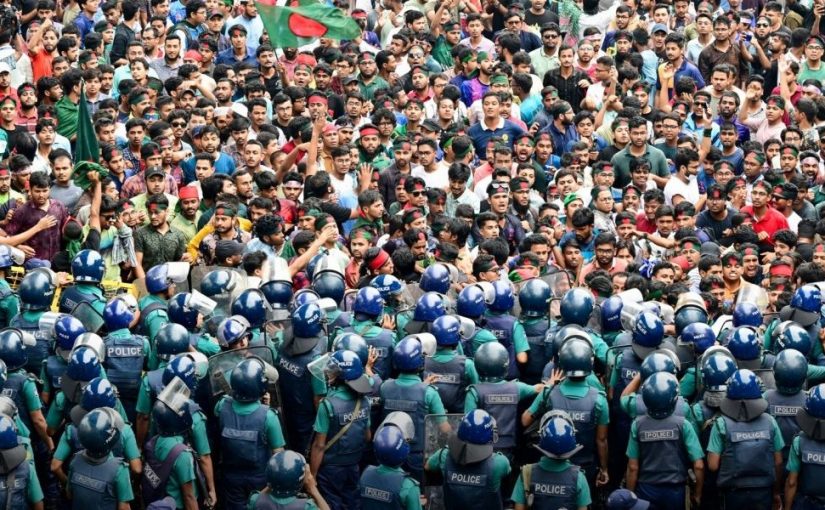By Syeda Shagufe Hossain
The 30% reservation of government jobs for grandchildren of liberation war veterans, who have never even seen the war, in a country that’s struggling with rising unemployment rates, seems unfair.
As I write, there are ongoing clashes all across Bangladesh. Young people in the country are being massacred, at least 114 people have been reportedly killed and thousands injured. A number of Bangladeshi news websites are down, including The Daily Star and Dhaka Tribune. All internet services and phone networks have been shut down. The protests, which started in response to the high court’s verdict declaring the circular issued in 2018 cancelling the 30% quota for freedom fighters’ descendants in government jobs illegal, has now escalated into a nation-wide crisis. This is a result of the government using brute force to curb the protest.
To onlookers, the ongoing protests in Bangladesh, must be difficult to wrap their heads around. After all, Bangladesh proudly boasts a notably large social safety net programmes allocation, accounting for almost 2.5% of the Gross Domestic Product (GDP). With 50 seats reserved in the parliament for women, and numerous other indicators of success, surely, the quota system is reflective of the ethos of equity of this emerging nation?
Unfortunately, that is not what the protesters taking to the street, willing to sacrifice their lives believe. The current system reserves up to 56% of government jobs for specific groups; 30% of the 56% is reserved for including descendants of 1971 Liberation War veterans, while 26% is reserved for women, people from underdeveloped districts, indigenous communities, and persons with disabilities. This leaves only 44% of the jobs which are open to general applicants.
Meanwhile, the Bangladesh Supreme Court on Sunday (July 21) has ordered 93% of the government jobs to be allocated on a merit-based system. Under the revised system, 5% of civil service positions will still be reserved for children of war veterans who fought for Bangladesh’s independence in 1971. An additional 2% will be allocated for other designated categories. The question about the unconstitutional violation of human rights experienced by the protesters still remains.
While protestors, and supporters, understand the value of a quota system reserved to protect the rights of those who have historically been victims of systematic marginalisation and/or oppression, the earlier system of 30% reservation for grandchildren of liberation war veterans, who have never even seen the war, in a country that’s struggling with rising unemployment rates, seemed unfair.
Easy enough to understand, one would suppose.
Unfortunately, the head of the state responded rather callously with a flippant comment loosely translated to: “If jobs aren’t reserved for veterans who should they be reserved for? Children of razakars?”
Now to an onlooker, who is learning the word razakar literally translates to ‘volunteer’, this might seem a bit of an overreaction. However, a little historical context searching will shed the light on the fact that being called a razakar is a pejorative term essentially being called a traitor to the state, because that was the title given to Bengalis who collaborated with the Pakistan army during the Liberation war of 1971.
So naturally, the protesters resorted to chanting slogans, loosely translated, “Who are you? Who am I? Razakar! Razakar! Said who? The Fascist government, that’s who!”
Obviously, this was a sarcastic response to Prime Minister Sheikh Hasina’s comment.
Easy enough to understand, one would suppose.
Unfortunately, not. If you thought the slogans were an overreaction, wait till you come across footage of the full-blown crackdown on the protesters complete with tanks and helicopters and all kinds of brute force to curb the protest.
We watch and wonder at how familiar it all sounds. Much like those of a narcissistic lover, one act of abuse reminds you of a previous one. Such as when students were advocating, similarly, for safe roads, and we all held our breaths, praying we would see our loved ones. And on August 2, 2018, the police and ‘people who are believed to be members of a pro-government youth league’, launched violent attacks on protesters and journalists. And before that, there were rumours of hundreds of madrasah students being killed and carried off in trucks.
But surely our memories are playing tricks on us. There is no way that every time there is a blackout, we wake up to a nightmare.
In January, Amnesty issued a ten point charter for the government including the following:
End the unnecessary and excessive use of force when responding to public demonstrations.
Fulfill Bangladesh’s obligations to protect and facilitate peaceful assembly and ensure that any responses (including restrictions) are lawful, necessary, proportionate, and in line with international standards.
Ensure that all arrests are carried out in line with due process safeguards and in accordance with international human rights law and standards, including but not limited to the right to a free and fair trial, the right to be informed of the reason for arrest and the place of detention, and the right to be brought promptly before a judge, and ensure access to legal counsel and family.
So why such an exaggerated reaction to what seems reasonable? The unnecessary tanks versus students situation?
Could it be that this movement challenges the very pillar of what Bangladeshi politics rests on and thereby the legitimacy of today’s power holders? After all, how has the head of the state herself maintained legitimacy if not through the power of the ‘quota mindset’? I belong here because of who my father is. The daughter who repeats her father’s tale, fervently and often, continues to do so as she enjoys fifteen years of unchecked power, ongoing.
Syeda Shagufe Hossain is a freelance development consultant and a concerned citizen of Bangladesh.
Courtesy: The Wire
